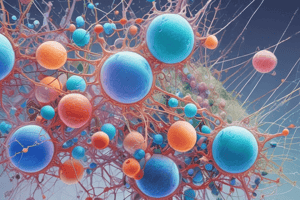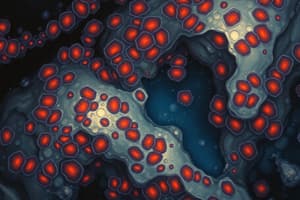Podcast
Questions and Answers
Which macromolecules form the extracellular matrix (ECM) components mentioned?
Which macromolecules form the extracellular matrix (ECM) components mentioned?
- Laminin and Type IV Collagen (correct)
- Integrins and Connexins
- Cadherins and Catenins
- Actin and Myosin
Cadherins are responsible for forming hemidesmosomes.
Cadherins are responsible for forming hemidesmosomes.
False (B)
What proteins form hexameric complexes in gap junctions?
What proteins form hexameric complexes in gap junctions?
Connexins
The adhesive glycoprotein mentioned that holds laminin and type IV collagen networks together is called ________.
The adhesive glycoprotein mentioned that holds laminin and type IV collagen networks together is called ________.
Match the following structures with their functions or characteristics:
Match the following structures with their functions or characteristics:
What is the primary role of cadherins in epithelial cells?
What is the primary role of cadherins in epithelial cells?
The central hydrophilic pore of connexons is 1.5 nm in diameter.
The central hydrophilic pore of connexons is 1.5 nm in diameter.
The process by which integrins bind extracellular macromolecules is facilitated by the presence of ________.
The process by which integrins bind extracellular macromolecules is facilitated by the presence of ________.
What is the primary function of glycolipids in the cell membrane?
What is the primary function of glycolipids in the cell membrane?
The glycoproteins in the glyocalyx do not assist in cell recognition.
The glycoproteins in the glyocalyx do not assist in cell recognition.
What enables cells to adhere to one another and provides protection against extracellular fluid?
What enables cells to adhere to one another and provides protection against extracellular fluid?
In the mitochondrial matrix, there exists a double-stranded circular _____ that is self-replicating.
In the mitochondrial matrix, there exists a double-stranded circular _____ that is self-replicating.
Which of the following incorrectly describes the properties of the phospholipid bilayer?
Which of the following incorrectly describes the properties of the phospholipid bilayer?
Match the following cellular components with their roles:
Match the following cellular components with their roles:
Steroid rings in the membrane primarily function as enzymes.
Steroid rings in the membrane primarily function as enzymes.
What is the name of the space between the outer and inner membranes of mitochondria?
What is the name of the space between the outer and inner membranes of mitochondria?
What shape of cells typically has elongated nuclei?
What shape of cells typically has elongated nuclei?
Cuboidal or pyramidal cells have flattened nuclei.
Cuboidal or pyramidal cells have flattened nuclei.
What is the connective tissue that underlies the epithelial lining in organs?
What is the connective tissue that underlies the epithelial lining in organs?
The area of contact between the epithelium and connective tissue may be increased by small evaginations called __________.
The area of contact between the epithelium and connective tissue may be increased by small evaginations called __________.
Which type of junction is the most apical and frequently found in epithelial tissues?
Which type of junction is the most apical and frequently found in epithelial tissues?
Match the following types of cells with their corresponding nucleus shape:
Match the following types of cells with their corresponding nucleus shape:
Epithelial cells generally show a lack of polarity.
Epithelial cells generally show a lack of polarity.
What are the contact points between plasma membranes of tissue cells called?
What are the contact points between plasma membranes of tissue cells called?
Study Notes
Extracellular Matrix (ECM) Components
- ECM consists of laminin and type IV collagen, forming 3-dimensional arrays.
- Laminin and type IV collagen networks are interconnected by the adhesive glycoprotein entactin/nidogen and the proteoglycan perlecan.
Adherens Junctions (Zonula Adherens)
- Form a continuous band beneath tight junctions, located at the luminal end of lateral membranes.
- Cell adhesion is mediated by cadherins—transmembrane glycoproteins that link to catenins and actin filaments.
- Function:
- Links cytoskeletons of adjacent cells, contributing to a cohesive epithelial layer.
- Part of the terminal web, involved in cytoplasmic motility.
Hemidesmosomes
- Modified desmosomes located at the basal surface of columnar epithelium.
- Transmembrane proteins known as integrins bind laminin and collagen type IV, functioning in the presence of calcium ions (Ca2+).
- Function:
- Anchors the cytoskeleton to the basal lamina.
Gap Junctions (Nexus)
- Facilitate intercellular communication via connexins that form hexameric complexes (connexons) with a central 1.5 nm pore.
- Nuclear shapes vary according to cell morphology: elongated nuclei in tall cells, flattened in squamous cells, spherical in cuboidal/pyramidal cells.
Cell Junctions
- Contact points between plasma membranes of tissue cells, crucial for adhesion and communication.
- Found in the lamina propria, connective tissue supporting various epithelial linings including digestive, respiratory, and urinary systems.
- Junctions are typically organized at the apical end of epithelial cells, with irregularities (papillae) enhancing contact area with connective tissue.
Tight Junctions (Zonula Occludens)
- Located at the most apical end of epithelial cells, forming bands encircling each cell.
- Common in epithelial tissues, especially those subject to friction, such as skin or tongue.
- Structure: Comprises web-like strands of transmembrane proteins, restricting passage between cells.
Membrane Structure and Function
- Epithelial cells exhibit polarity with differing characteristics on each side of their membranes.
- Glycolipids (5% of membrane composition) have attached carbohydrate groups, contributing to asymmetry.
- Glycocalyx is a sugary coating from glycolipids and glycoproteins, enabling cell recognition and adhesion.
Mitochondrial Structure
- Intermembranous space exists between the outer and inner mitochondrial membranes.
- Mitochondrial matrix contains double-stranded circular DNA, ribosomes, and dense matrix granules, contributing to self-replication and enzyme functionality.
Studying That Suits You
Use AI to generate personalized quizzes and flashcards to suit your learning preferences.
Related Documents
Description
This quiz covers the structures and functions of macromolecules secreted by epithelial cells, particularly focusing on the extracellular matrix (ECM) components such as laminin and type IV collagen. Additionally, it explores the role of adherent junctions and hemidesmosomes in cellular organization.




